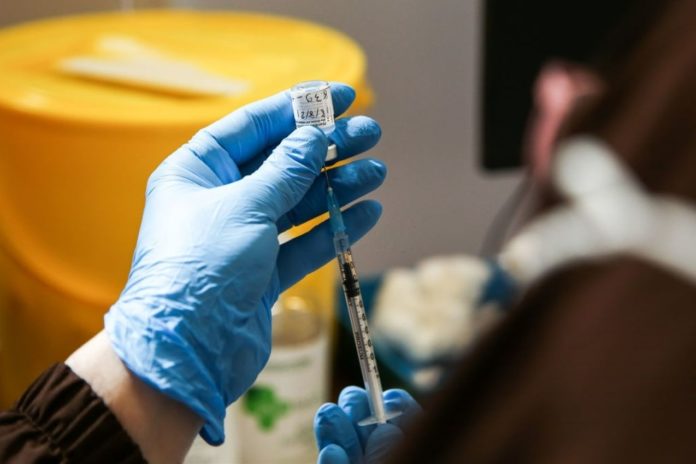Figure taken from the OCTAVE research, which was established to close the information gap generated by an insufficient number of chronically ill and immunocompromised persons participating in vaccine trials.
In the ongoing project, researchers hope to collect data from over 3,000 immunocompromised individuals, including those suffering from cancer, renal disease or liver failure as well as those suffering from inflammatory arthritis, Crohn’s disease, inflammatory bowel disease, or vasculitis.
Using immune responses from 600 patients with immune-mediated inflammatory disorders and 231 healthy adults who had received both doses of either the AstraZeneca or Pfizer vaccinations, researchers from the Universities of Glasgow and Birmingham examined the immune responses between the two groups.
People from the susceptible group had antibody responses that were similar to those seen in healthy adults, whereas the rest of the population had antibody responses that were lower than those seen in healthy individuals.
Four weeks after receiving the second vaccination, 11 percent of the participants failed to produce any antibodies, with the researchers claiming that practically all of these individuals had vasculitis, a category of rare disorders that cause inflammation of the blood vessels.
Antibodies, on the other hand, are not the only weapon in the human body’s arsenal against COVID-19.
T cells, a kind of white blood cell, are the master regulators of the immune system, and the study found that the T cell response in almost all patient groups was similar to that of healthy individuals.
The T cell response was strong even in those who had undetectable antibody levels, showing that at the very least some type of immunological response had been generated.
It is unclear what this means for the strength of the vaccine’s protection for these individuals – although we know that there is a link between higher levels of antibodies and neutralization of COVID-19, we do not know what levels of antibodies are required for protection against the virus in these individuals.
Co-investigator Prof Carl Goodyear said:
“When we look at the T cell responses across all the cohort, they look identical to the healthy controls, so there was a robust T cell response being generated.
“The vaccine is actually immunologically active in all patients, they can mount an immunological response.
“It’s the type of response to the quality of the response we’re really trying to understand here.”
According to statistics from the Office for National Statistics, there were 571 deaths in England and Wales in the week ending August 13 in which COVID-19 was listed on the death certificate, an increase of 8% over the previous week and the highest number since March.
Experts are likely to offer a recommendation on whether to administer booster vaccinations to vulnerable populations during the autumn, ahead of what is expected to be a tough winter.
Trial lead, professor Iain McInnes, from the University of Glasgow, said:
“Our data suggests that a booster for people who have mounted either an absent or lower level of antibody response would be a very reasonable next step.
“Our view as a group of investigators is that the third inoculation would indeed be a reasonable approach, but we are only one part of the data set that will inform wider policy.”
Describing the absence of antibody response among some immunocompromised patients as “probably not ideal”, he added that the “large majority” of people in these groups were “probably going to be fine”, although “more work is required to be absolutely reassured”.
Professor Charles Swanton, Cancer Research UK’s chief clinician, said the study “reflects the evidence we’ve seen so far and includes only a small number of cancer patients, with a limited number of cancer types”.
“Overall, the majority of cancer patients had an immune response to the vaccine, even if levels of antibodies were lower in some cases than healthy controls, but the study didn’t look at how this response translates to COVID-19 protection.
“We urgently need data across blood and solid tumour cancer types to understand which groups are most at risk from vaccine breakthrough infections.”
He urged cancer sufferers to be vaccinated if possible and to follow their doctor’s instructions.
The study has been published as a pre-print by The Lancet.
Photo by Dinendra Haria/SOPA Images/LightRocket via Getty Images
